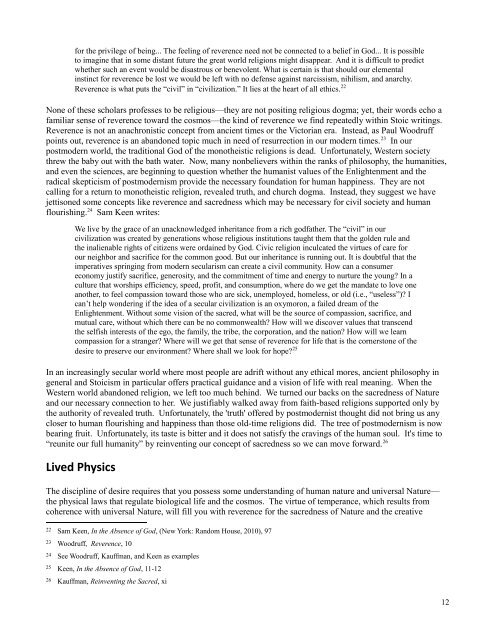Self-Coherence: - College of Stoic Philosophers
Self-Coherence: - College of Stoic Philosophers
Self-Coherence: - College of Stoic Philosophers
Create successful ePaper yourself
Turn your PDF publications into a flip-book with our unique Google optimized e-Paper software.
for the privilege <strong>of</strong> being... The feeling <strong>of</strong> reverence need not be connected to a belief in God... It is possibleto imagine that in some distant future the great world religions might disappear. And it is difficult to predictwhether such an event would be disastrous or benevolent. What is certain is that should our elementalinstinct for reverence be lost we would be left with no defense against narcissism, nihilism, and anarchy.Reverence is what puts the “civil” in “civilization.” It lies at the heart <strong>of</strong> all ethics. 22None <strong>of</strong> these scholars pr<strong>of</strong>esses to be religious—they are not positing religious dogma; yet, their words echo afamiliar sense <strong>of</strong> reverence toward the cosmos—the kind <strong>of</strong> reverence we find repeatedly within <strong>Stoic</strong> writings.Reverence is not an anachronistic concept from ancient times or the Victorian era. Instead, as Paul Woodruffpoints out, reverence is an abandoned topic much in need <strong>of</strong> resurrection in our modern times. 23 In ourpostmodern world, the traditional God <strong>of</strong> the monotheistic religions is dead. Unfortunately, Western societythrew the baby out with the bath water. Now, many nonbelievers within the ranks <strong>of</strong> philosophy, the humanities,and even the sciences, are beginning to question whether the humanist values <strong>of</strong> the Enlightenment and theradical skepticism <strong>of</strong> postmodernism provide the necessary foundation for human happiness. They are notcalling for a return to monotheistic religion, revealed truth, and church dogma. Instead, they suggest we havejettisoned some concepts like reverence and sacredness which may be necessary for civil society and humanflourishing. 24 Sam Keen writes:We live by the grace <strong>of</strong> an unacknowledged inheritance from a rich godfather. The “civil” in ourcivilization was created by generations whose religious institutions taught them that the golden rule andthe inalienable rights <strong>of</strong> citizens were ordained by God. Civic religion inculcated the virtues <strong>of</strong> care forour neighbor and sacrifice for the common good. But our inheritance is running out. It is doubtful that theimperatives springing from modern secularism can create a civil community. How can a consumereconomy justify sacrifice, generosity, and the commitment <strong>of</strong> time and energy to nurture the young? In aculture that worships efficiency, speed, pr<strong>of</strong>it, and consumption, where do we get the mandate to love oneanother, to feel compassion toward those who are sick, unemployed, homeless, or old (i.e., “useless”)? Ican’t help wondering if the idea <strong>of</strong> a secular civilization is an oxymoron, a failed dream <strong>of</strong> theEnlightenment. Without some vision <strong>of</strong> the sacred, what will be the source <strong>of</strong> compassion, sacrifice, andmutual care, without which there can be no commonwealth? How will we discover values that transcendthe selfish interests <strong>of</strong> the ego, the family, the tribe, the corporation, and the nation? How will we learncompassion for a stranger? Where will we get that sense <strong>of</strong> reverence for life that is the cornerstone <strong>of</strong> thedesire to preserve our environment? Where shall we look for hope? 25In an increasingly secular world where most people are adrift without any ethical mores, ancient philosophy ingeneral and <strong>Stoic</strong>ism in particular <strong>of</strong>fers practical guidance and a vision <strong>of</strong> life with real meaning. When theWestern world abandoned religion, we left too much behind. We turned our backs on the sacredness <strong>of</strong> Natureand our necessary connection to her. We justifiably walked away from faith-based religions supported only bythe authority <strong>of</strong> revealed truth. Unfortunately, the 'truth' <strong>of</strong>fered by postmodernist thought did not bring us anycloser to human flourishing and happiness than those old-time religions did. The tree <strong>of</strong> postmodernism is nowbearing fruit. Unfortunately, its taste is bitter and it does not satisfy the cravings <strong>of</strong> the human soul. It's time to“reunite our full humanity” by reinventing our concept <strong>of</strong> sacredness so we can move forward. 26Lived PhysicsThe discipline <strong>of</strong> desire requires that you possess some understanding <strong>of</strong> human nature and universal Nature—the physical laws that regulate biological life and the cosmos. The virtue <strong>of</strong> temperance, which results fromcoherence with universal Nature, will fill you with reverence for the sacredness <strong>of</strong> Nature and the creative22 Sam Keen, In the Absence <strong>of</strong> God, (New York: Random House, 2010), 9723Woodruff, Reverence, 1024 See Woodruff, Kauffman, and Keen as examples25Keen, In the Absence <strong>of</strong> God, 11-1226 Kauffman, Reinventing the Sacred, xi12
















